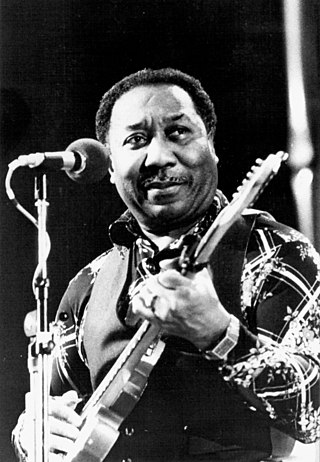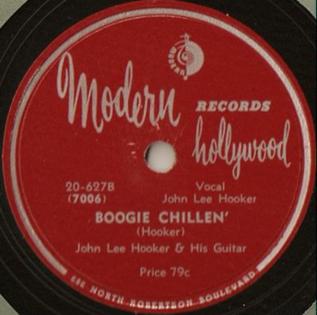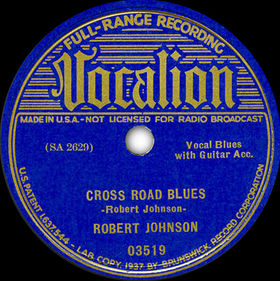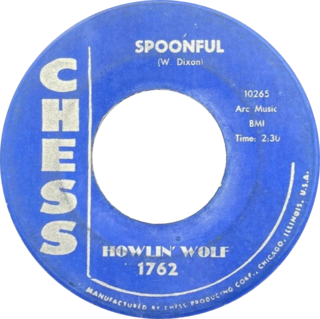
Blues is a music genre and musical form that originated in the Deep South of the United States around the 1860s. Blues incorporated spirituals, work songs, field hollers, shouts, chants, and rhymed simple narrative ballads from the African-American culture. The blues form is ubiquitous in jazz, rhythm and blues, and rock and roll, and is characterized by the call-and-response pattern, the blues scale, and specific chord progressions, of which the twelve-bar blues is the most common. Blue notes, usually thirds, fifths or sevenths flattened in pitch, are also an essential part of the sound. Blues shuffles or walking bass reinforce the trance-like rhythm and form a repetitive effect known as the groove.

Slide guitar is a technique for playing the guitar that is often used in blues music. It involves playing a guitar while holding a hard object against the strings, creating the opportunity for glissando effects and deep vibratos that reflect characteristics of the human singing voice. It typically involves playing the guitar in the traditional position with the use of a slide fitted on one of the guitarist's fingers. The slide may be a metal or glass tube, such as the neck of a bottle, giving rise to the term bottleneck guitar to describe this type of playing. The strings are typically plucked while the slide is moved over the strings to change the pitch. The guitar may also be placed on the player's lap and played with a hand-held bar.

McKinley Morganfield, known professionally as Muddy Waters, was an American blues singer and musician who was an important figure in the post-World War II blues scene, and is often cited as the "father of modern Chicago blues". His style of playing has been described as "raining down Delta beatitude".
Chicago blues is a form of blues music that developed in Chicago, Illinois. It is based on earlier blues idioms, such as Delta blues, but is performed in an urban style. It developed alongside the Great Migration of African Americans of the first half of the twentieth century. Key features that distinguish Chicago blues from the earlier traditions, such as Delta blues, is the prominent use of electrified instruments, especially the electric guitar, and especially the use of electronic effects such as distortion and overdrive.
Electric blues is blues music distinguished by the use of electric amplification for musical instruments. The guitar was the first instrument to be popularly amplified and used by early pioneers T-Bone Walker in the late 1930s and John Lee Hooker and Muddy Waters in the 1940s. Their styles developed into West Coast blues, Detroit blues, and post-World War II Chicago blues, which differed from earlier, predominantly acoustic-style blues. By the early 1950s, Little Walter was a featured soloist on blues harmonica using a small hand-held microphone fed into a guitar amplifier. Although it took a little longer, the electric bass guitar gradually replaced the stand-up bass by the early 1960s. Electric organs and especially keyboards later became widely used in electric blues.
Blues rock is a fusion genre and form of rock music that relies on the chords/scales and instrumental improvisation of blues. It is mostly an electric ensemble-style music with instrumentation similar to electric blues and rock. From its beginnings in the early to mid-1960s, blues rock has gone through several stylistic shifts and along the way it inspired and influenced hard rock, Southern rock, and early heavy metal.

"Boogie Chillen'" or "Boogie Chillun" is a blues song first recorded by John Lee Hooker in 1948. It is a solo performance featuring Hooker's vocal, electric guitar, and rhythmic foot stomps. The lyrics are partly autobiographical and alternate between spoken and sung verses. The song was his debut record release and in 1949, it became the first "down-home" electric blues song to reach number one in the R&B records chart.

Blues is a compilation album of blues songs recorded by American singer/songwriter/musician Jimi Hendrix. Compiled by interim Hendrix producer Alan Douglas, it was released April 26, 1994, by MCA Records. The album contains eleven songs recorded by Hendrix between 1966 and 1970, six of which were previously unreleased. Hendrix wrote seven of the pieces; other writers include Muddy Waters, Booker T. Jones, and Elmore James. Most are demos, jams, and live recordings, which Hendrix may or may not have completed for release.
"Voodoo Chile" is a song written by Jimi Hendrix and recorded in 1968 for the third Jimi Hendrix Experience album Electric Ladyland. It is based on the Muddy Waters blues song "Rollin' Stone", but with original lyrics and music. At 15 minutes, it is Hendrix's longest studio recording and features additional musicians in what has been described as a studio jam.

"Cross Road Blues" is a song written by the American blues artist Robert Johnson. He performed it as a solo piece with his vocal and acoustic slide guitar in the Delta blues-style. The song has become part of the Robert Johnson mythology as referring to the place where he supposedly sold his soul to the Devil in exchange for his musical talent. This is based largely on folklore of the American South that identifies a crossroads as the site where such pacts are made, although the lyrics do not contain any references to Satan or a Faustian bargain.

"On the Road Again" is a song recorded by the American blues rock group Canned Heat in 1967. A driving blues rock boogie, it was adapted from earlier blues songs and includes mid-1960s psychedelic rock elements. Unlike most of Canned Heat's songs from the period which were sung by Bob Hite, second guitarist and harmonica player Alan Wilson provides the distinctive high pitched vocal, sometimes described as a falsetto.

"Spoonful" is a blues song written by Willie Dixon and first recorded in 1960 by Howlin' Wolf. Called "a stark and haunting work", it is one of Dixon's best known and most interpreted songs. Etta James and Harvey Fuqua had a pop and R&B record chart hit with their duet cover of "Spoonful" in 1961, and it was popularized in the late 1960s by the British rock group Cream.

"Smokestack Lightning" is a blues song recorded by Howlin' Wolf in 1956. It became one of his most popular and influential songs. It is based on earlier blues songs, and numerous artists later interpreted it.

"Rollin' Stone" is a blues song recorded by Muddy Waters in 1950. It is his interpretation of "Catfish Blues", a Delta blues that dates back to 1920s Mississippi. "Still a Fool", recorded by Muddy Waters a year later using the same arrangement and melody, reached number nine on the Billboard R&B chart. "Rollin' Stone" has been recorded by a variety of artists.

"Train Kept A-Rollin'" is a song first recorded by American jazz and rhythm and blues musician Tiny Bradshaw in 1951. Originally performed in the style of a jump blues, Bradshaw borrowed lyrics from an earlier song and set them to an upbeat shuffle arrangement that inspired other musicians to perform and record it. Johnny Burnette and the Rock and Roll Trio made an important contribution in 1956 – they reworked it as a guitar riff-driven song, which features an early use of intentionally distorted guitar in rock music.
William "Hambone Willie" Newbern was an American country blues musician who was active from the 1920s to the 1940s.

"Little Red Rooster" is a blues standard credited to arranger and songwriter Willie Dixon. The song was first recorded in 1961 by American blues musician Howlin' Wolf in the Chicago blues style. His vocal and slide guitar playing are key elements of the song. It is rooted in the Delta blues tradition and the theme is derived from folklore. Musical antecedents to "Little Red Rooster" appear in earlier songs by blues artists Charlie Patton and Memphis Minnie.

Vintage is the sixth album by Canned Heat. Produced by Johnny Otis, the album featured the Muddy Waters/Elmore James' song "Rollin' and Tumblin'" recorded with and without Alan Wilson's harmonica leads. These sessions have surfaced on a multiple of reissues including, Don't Forget to Boogie: Vintage Heat (2002), Vintage Canned Heat (1996), Eternal Boogie, Canned Heat in Concert and various other releases.

The Essential Johnny Winter is a two-CD album by guitarist and singer Johnny Winter. It is a compilation of songs from previously released albums, many of them from the late 1960s and the 1970s. It was released by Columbia Records on April 30, 2013.
Walter Rhodes was an American blues musician, who recorded briefly in the late 1920s and was unusual in being a blues accordionist and singer from Mississippi. It was reported that Rhodes may have been the oldest Delta musician recorded. Little is known of his life outside of his recordings.














